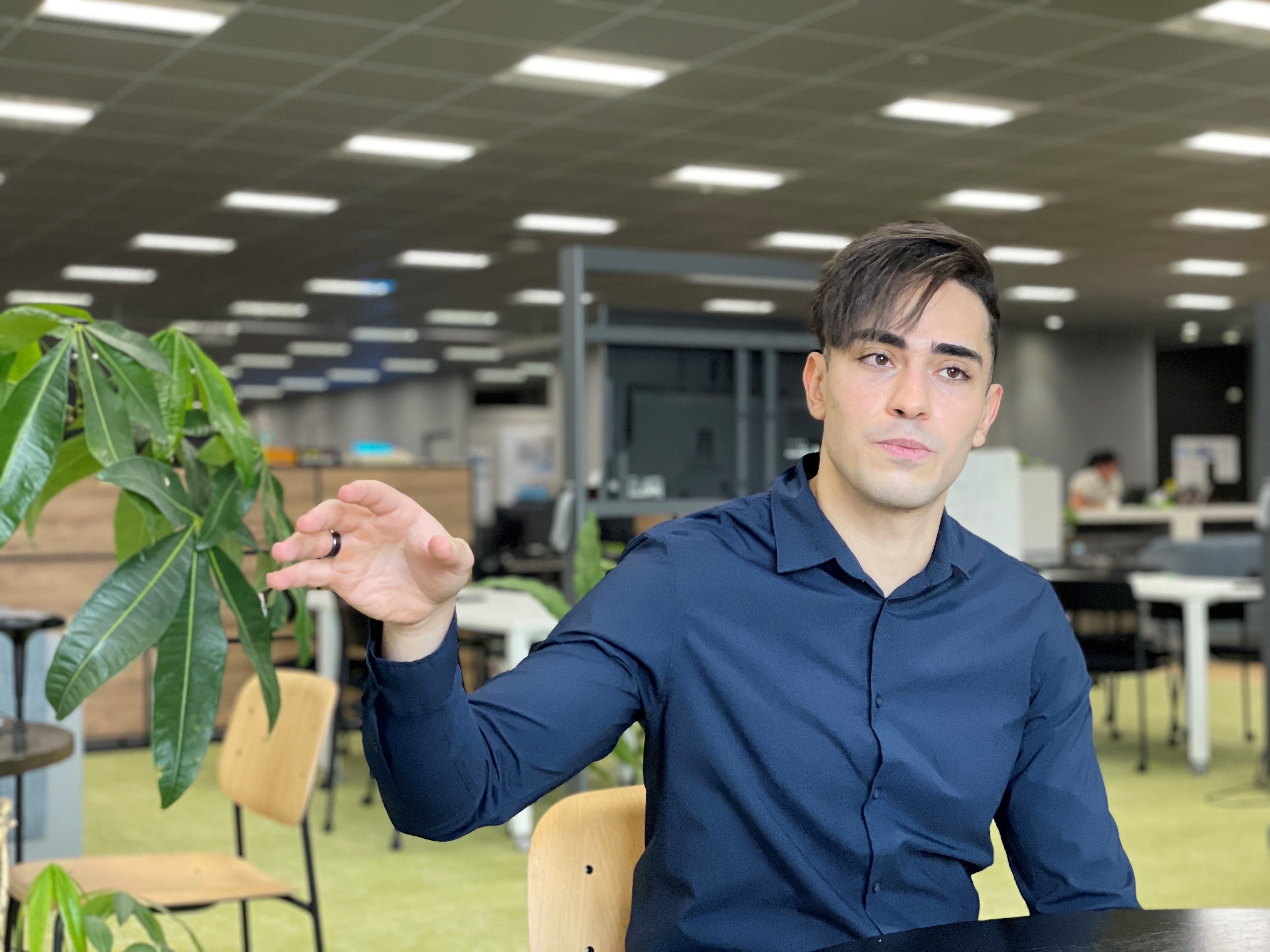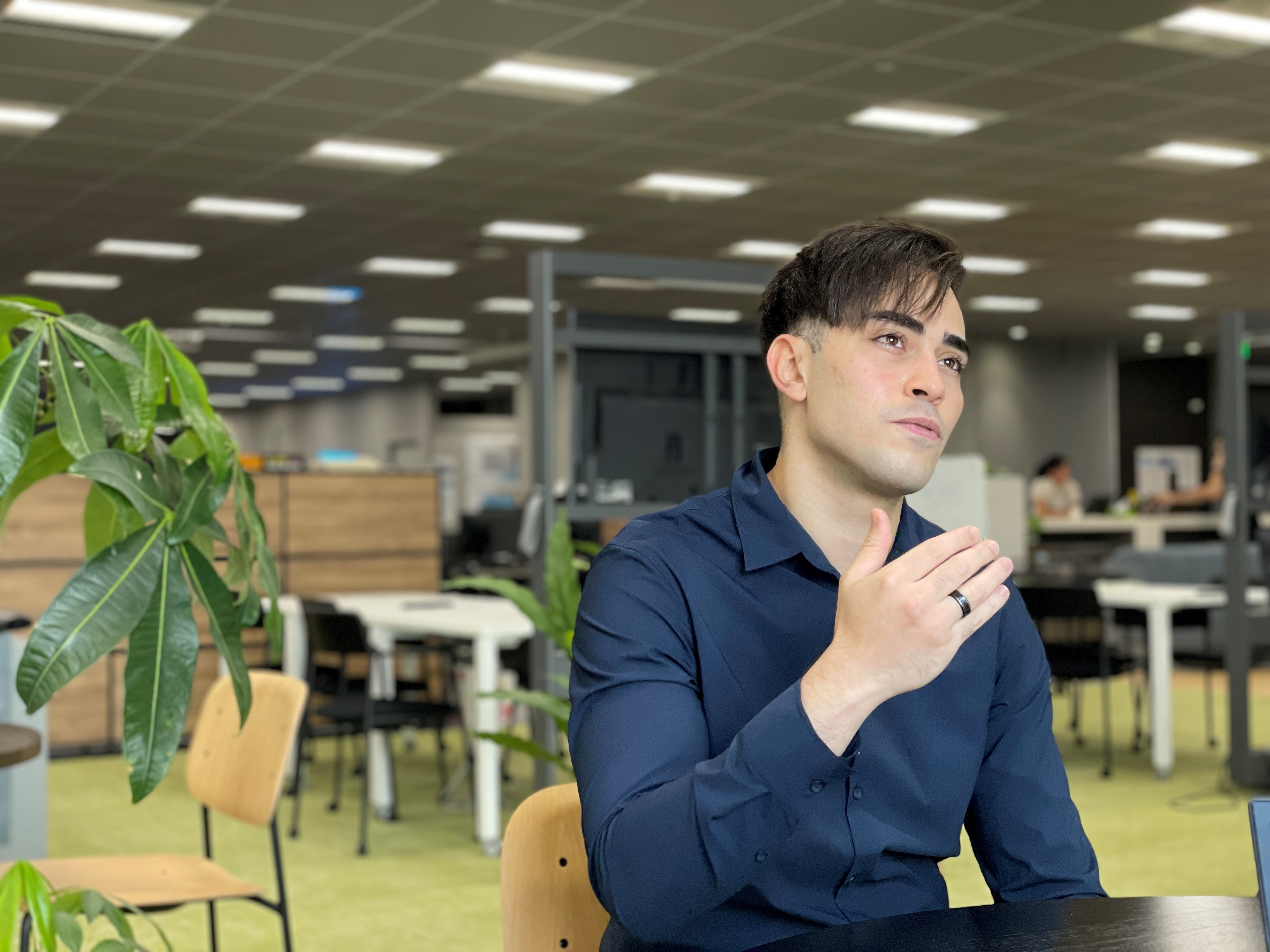RGFプロフェッショナルリクルートメントジャパンで働く社員に、RGFでの働き方について聞いた、A Consultant's Story。
今回は、Senior Consultantとして活躍している社員に、RGFでの働き方から入社の理由、将来の目標まで、いろいろ話を聞いてみました。
In the Past

Q: Why did you decide to join RGF Professional Recruitment Japan?
During the initial phase of my job search, I considered several companies. RGF Professional Recruitment Japan was brought to my attention through a friend. As someone completely new to the field of recruitment, I was seeking an environment that would allow me to learn directly from experienced professionals without subjecting me to aggressive micromanagement. Throughout the interview process with RGF, I found that the company's culture was incredibly welcoming and open to ideas. They would posed open-ended questions, demonstrating a genuine interest in my potential as a recruiter rather than merely testing my limits. Right from the very beginning even at the interview stage, it was clear that RGF values a culture of empowerment rather than micromanagement, and this was a significant factor in my decision to join RGF in the end.
Q: When did you become a part of RGF Professional Recruitment Japan?
I joined the company in December 2019. It was an interesting time to start, as it was just before the onset of the Covid-19 pandemic. Although I had initially sought a job that would allow me to learn directly from colleagues in an office setting, the pandemic forced us to transition to remote work. Despite this shift, RGF effectively bridged the gaps for remote teams. Even though my team was quite sizable at the time, we maintained open and consistent communication, particularly with our managers. This support network played a crucial role in helping me navigate the initial challenges of the job.
Current Working Condition

Q: Have you been able to leverage your previous work experience in your current role?
Yes. We collaborate with numerous clients from my previous industry, and interestingly, my former company is even listed in our client database. Witnessing my previous employer become a client has been a fascinating experience. When I was an employee, I didn't fully grasp the intricacies of the company's business affairs. However, in my role as a recruiter, I now need to understand these aspects. This prior knowledge has provided me with a valuable advantage. Learning about a company's business and sales processes has added an engaging dimension to my work, as I now comprehend why a company was established and more.
Q: Can you share any challenges or difficulties you encountered after joining RGF?
Certainly. One of the primary challenges in recruitment is the length of the process. It's easy to become demotivated, especially during the initial months when you're learning a lot and performing repetitive tasks to build familiarity. This phase was particularly challenging for me because it was so different from my previous role as an engineer. As an engineer, you typically see results more quickly when working on a product. However, in recruitment, outcomes are less predictable. Nevertheless, this uncertainty adds an exciting dimension to the job. It's both challenging and motivating because it keeps you focused on your goals, such as placing candidates or working with specific companies. Setting and pursuing these goals in recruitment is an effective way to progress, even during the doubt-filled moments. Some goals include “I want to place this candidate”, “I want to work with this company”, “I want to make this much money”.
Q: Did setting goals help you overcome these challenges?
Absolutely. Setting goals, whether short-term or long-term, proved to be a crucial strategy for me.
Q: What was your first short-term goal when you began?
Initially, my team primarily focused on filling sales positions. To differentiate myself as a first-time recruiter, I aimed to place a non-sales position. Specifically, I targeted a pre-sales role, which was more challenging but ultimately more engaging.
Q: How long did it take for you to achieve your very first placement?
It took approximately two and a half months.
Q: Can you describe your current responsibilities?
When I initially joined the team, I concentrated on filling junior positions and aimed to fill as many as possible. Over time, I've become more selective in terms of both the companies I work with and the positions I focus on. Presently, I primarily handle senior roles, which I find more intriguing. Working on senior roles allows me to engage with leaders in the IT industry, adding an exciting dimension to my work.
Q: Are you selective with the clients as well, or do you primarily focus on positions?
I'm selective with both clients and positions. For instance, I primarily focus on startups in the early stages of development in Japan. I find working with such companies more exciting than with well-established organizations. Assisting startups in entering the market, gaining traction, and achieving popularity is a particularly rewarding aspect of my work.
Q: What aspects of your job do you value the most?
Networking is undoubtedly a crucial aspect of this job. Expanding my professional network is not only important for recruitment but also for personal growth. Additionally, managing seemingly mundane tasks, such as repetitive sourcing and client/CDD meetings, is essential. These daily activities, although they may appear monotonous, are the backbone of the recruitment process. It's crucial to maintain consistency in these tasks to yield results.
Q: What do you find most rewarding about your job?
The most rewarding aspect is witnessing the impact on both CDDs (Candidates) and CLs (Clients) in the market. For example, when you place a Ssales Ddirector or Ssenior Ssales Ddirector, and they announce significant deals on LinkedIn, it feels like you've played a role in their success. You become part of the process of acquiring top talent and achieving business goals, which is immensely satisfying. It's a testament to the fact that we're not outsiders; we're integral parts of the industry.
Q: Can you share a specific episode that was particularly important to you?
One significant challenge I faced was working with a very difficult client attempting to enter the highly traditional Japanese market, where only a few major players dominate. This client sought to establish a presence amidst these giants and sell their products. They needed to hire a country manager, arguably the most challenging position I've ever worked on. However, the achievement was equally remarkable. The individual we placed as the Ccountry Mmanager signed multimillion-dollar deals within six months and is on the verge of finalizing a deal with the CEO of Softbank. I had dinner with him recently, and hearing his success stories was truly astounding. I never expected such an outcome from a candidate I placed, and it was incredibly gratifying to know that I contributed to his success.
Q: What topics do you typically discuss during these calls?
During our calls, we often discuss various aspects of our work. For instance, if we have a promising candidate, we might call a colleague to encourage them to review the candidate's profile. This initiates discussions not only about the candidate but also potential clients who might be interested. This ongoing and dynamic communication proves to be highly beneficial for mutual education and continuous learning.
Q: Can you share any strategies for sourcing quality candidates on LinkedIn?
Certainly, persistence is key. I maintain a relentless focus on identifying outstanding candidates who are a strong fit for the positions I'm recruiting for. While others might continue scouting candidates indiscriminately, I prefer to concentrate my efforts on individuals I genuinely believe would be a good match. I am unwavering in my persistence, which proved instrumental in a specific case. For instance, with the Country Manager I successfully placed, he initially declined my outreach. However, I didn't give up; I reached out again, and this time he agreed to have a conversation. Persistence can yield positive results in sourcing top candidates.
In the Future

Q: What future challenges or achievements are you striving for?
Currently, the IT job market faces numerous challenges, including layoffs and hiring freezes, which have affected the candidate pool. My goal is to develop revenue streams that enable us to collaborate more effectively with foreign capital companies. Given our bilingual nature and affiliation with Recruit, I believe our core mission should revolve around supporting foreign companies seeking bilingual candidates in Japan. My mission is to establish a startup ecosystem within RGF, enabling us to work closely with smaller companies and ventures to provide superior service.
Q: In your opinion, what sets RGF apart from other recruitment agencies?
In comparison to other agencies I've interviewed with, RGF stands out due to its culture of embracing diverse opinions and contributions from employees, even shortly after joining. Expectations are not imposed rigidly but are supported by the management to help individuals meet them. Unlike some other agencies that push their employees to fill sales gaps, RGF maintains a more nurturing approach. I believe the people-oriented culture at RGF is its strongest attribute. It fosters a more enjoyable and open work environment, where communication flows freely.
Q: A lot of new recruiters who don’t have any experience would be worried that they don’t have enough credibility to give advice to candidates. Do you think that your previous experience in IT helped you to gain credibility with candidates?
I believe that my IT background has indeed enhanced my credibility with candidates. It has enabled me to grasp the value of technology in a profound way. I am committed to thoroughly understanding our clients, not only in terms of their organizational culture but also their products or services. My engineering background equips me to dive into the intricacies of our clients' offerings and comprehend why their product stands out in the market. This depth of understanding is an asset when communicating with candidates, as it demonstrates a genuine appreciation of the client's business in every detail.
Q: Message for the people who would like to join RGF?
If you are seeking an environment where personal growth is nurtured without judgment, RGF is an ideal fit for you. RGF provides the necessary resources and autonomy, allowing you to pursue your own goals and results. This is precisely the kind of environment that fuels success in the field of recruitment.
Q: What characteristics do you believe high performers in your role share?
In our line of work, the most successful recruiters share several key characteristics. They are exceptionally attentive, consistently picking up calls promptly and reaching out to candidates before anyone else. Being swift and proactive is essential in our profession. These top recruiters are quick to respond and seize opportunities as soon as they arise, giving them a competitive edge. Their ability to act swiftly and efficiently is what sets them apart and contributes to their success.